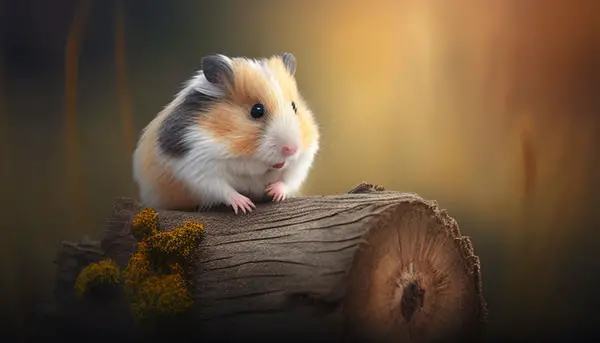Why is My Hamster Losing Hair [Mystery Solved]
One important aspect of a hamster’s appearance is its coat of fur. A healthy coat of fur is essential as it serves as a visual indicator of their overall health. And losing this fur displays a concerning issue.
So you may ask, why is my hamster losing hair? Hair loss in hamsters can occur for a variety of reasons, including stress, poor diet, and underlying health problems. In order to keep a hamster’s coat full of fur and healthy, it is important to understand the causes of hair loss.
This article will provide information on the common causes of hair loss in hamsters, as well as tips for preventing and treating this issue.
Why is My Hamster Losing Hair: Common Causes
Hair loss in hamsters can be a worrying issue for pet owners, as it can indicate a more serious underlying problem. The following are some of the common causes of hair loss in hamsters:

| Causes | Explanation |
|---|---|
| Stress | Result from self-grooming behavior |
| Mites/Infections | Itching and scratching due to skin issues |
| Nutritional Deficiencies | Lack of vitamins and minerals in diet |
| Hormonal Imbalances | Age, reproductive problems, health issues |
| Genetics | Inherited hair loss |
1. Stress
Hamsters are highly sensitive to changes in their environment and can easily become stressed. This stress can manifest in several ways, including hair loss. When hamsters are stressed, they may engage in self-grooming behavior that results in hair loss.

2. Mites and skin infections
Hamsters are prone to skin infections and mites, which can cause itching and scratching. This excessive scratching can lead to hair loss and skin irritation. Mites and skin infections can be diagnosed and treated by a veterinarian.
3. Nutritional deficiencies
The absence of certain vitamins and minerals in a hamster’s diet can result in hair loss. For instance, a lack of biotin can cause hair loss and skin issues. It’s crucial to provide your hamster with a well-balanced diet that meets its nutritional needs in order to maintain good health and prevent hair loss.

4. Hormonal imbalances
Hormonal imbalances can also contribute to hair loss in hamsters. This can be caused by factors such as age, reproductive problems, or other underlying health issues. Hormonal imbalances can be diagnosed and treated by a veterinarian.
5. Genetics
In some cases, hair loss may be due to genetics. This means that it may run in the family and is beyond the control of pet owners. If a hamster is prone to hair loss due to genetics, it is important to provide them with a healthy diet and proper care to help minimize the effects.
Signs That Indicate Your Hamster May Be Losing Hair
All of the signs listed here can indicate that your hamster may be losing hair and experiencing skin problems.

- Excessive scratching is a common sign that something is irritating your hamster’s skin and may be causing hair loss
- Bald patches may indicate that your hamster is losing hair in specific areas and can be a sign of a skin condition or parasite infestation
- Red, inflamed skin can be a sign of skin irritation, infection, or parasite infestation
- Flaking skin can indicate a skin condition or parasite infestation, as well as a lack of proper grooming or hydration
- The presence of mites, also known as mange mites, can cause hair loss and skin irritation in hamsters and other small animals
Diagnosing The Cause Of Hair Loss In Your Hamster
Hair loss in hamsters can have several underlying causes, including mites, bacterial or fungal infections, hormonal imbalances, and dietary deficiencies. To accurately diagnose the cause of hair loss, it’s important to consult with a veterinarian.

Consultation with a veterinarian
During the consultation, your veterinarian will thoroughly examine your hamster. He can also ask you about its history, including any changes in diet, behavior, or environment.
Your veterinarian may also ask you about any previous illnesses, treatments, or medications received.
Physical examination
Your veterinarian will examine your hamster’s skin, fur, and nails for signs of infection, mites, or other skin conditions. They may also look for any bald spots, redness, or skin scaling, which can indicate underlying skin problems.
Laboratory tests
To confirm a diagnosis, your veterinarian may perform laboratory tests, including skin scrapings and blood tests. Skin scrapings will be taken from affected areas and examined for mites or other parasites under a microscope.
Blood tests can check for any underlying hormonal imbalances or nutritional deficiencies that may be causing hair loss.
In summary, hair loss in hamsters is a common problem, but the underlying cause is not always obvious. To ensure the best possible outcome for your pet, it’s important to work closely with a veterinarian. Especially who have experience in diagnosing and treating skin problems in small animals.
Prevention Of Hair Loss In Hamsters
Prevention of hair loss in hamsters is important to maintain their overall health and well-being. Here are some tips that can help prevent hair loss:

- Regular vet check-ups: Regular check-ups with a veterinarian are vital to the health of your hamster, particularly in cases of hair loss. These check-ups can help rule out any underlying health conditions that may be responsible for hair loss.
- Maintaining a healthy diet: To maintain the best health in your hamster, it’s crucial to provide them with a well-rounded diet. Make access to fresh water, as well as a diet that’s high in protein, fiber, and crucial vitamins and minerals.
- Providing a clean and comfortable living environment: Making sure your hamster has a clean and cozy home is essential for maintaining their health. Cleaning their cage and bedding on a regular basis is essential to prevent the growth of harmful germs.
- Monitoring for signs of stress and addressing them promptly: To ensure your hamster’s well-being, it’s important to monitor their behavior and appetite for any indications of stress, and take immediate steps.
By following these tips, you can help prevent hair loss in your hamster and ensure that it stays healthy and happy.
If you’re interested in learning more about hamster behavior, you may want to check out our articles on why your hamster is trying to escape and why your hamster is sleeping so much. Our article on why your hamster is trying to escape explains the reasons behind this behavior and how to address it. Meanwhile, our article on why your hamster is sleeping so much explores the possible reasons why your hamster might be napping more than usual and when it might be a cause for concern.FAQs
Now let’s see some relevant questions regarding the hair loss of your hamster.
Q: How can I determine if my hamster is experiencing hair loss as a result of stress or anxiety?
Stress and anxiety can contribute to hair loss, so it is important to create a calm and relaxed environment for your pet. Providing plenty of toys and hiding places can help to reduce stress and prevent hair loss.
Q: Are there any grooming techniques that can help improve the health of a hamster’s coat?
Yes. Regular grooming and bathing can help to improve the health of the coat. It is also better not to use harsh chemicals on your pets like soaps and shampoos.
Q: Can hair loss in hamsters be reversed or will the hamster always have hair loss?
Yes. In some cases, hair loss in hamsters can be reversed. Especially if the underlying cause is treated promptly. However, in other cases, hair loss may be permanent, and it may require ongoing care to maintain its skin and coat health.
Conclusion
Losing hair can be a stressful experience for your furry friend, but with the right knowledge and care, it doesn’t have to be. From stress to mites and nutrition, various factors can contribute to hair loss in hamsters. Next time you ask why is my hamster losing hair, you have an answer.
Stay alert for signs like excessive scratching and bald patches, and don’t hesitate to seek veterinary help. Your hamster can keep its fluffy and fabulous coat with the right treatment and preventative measures. Let’s work together to keep our hamsters healthy, happy, and hair-full!




